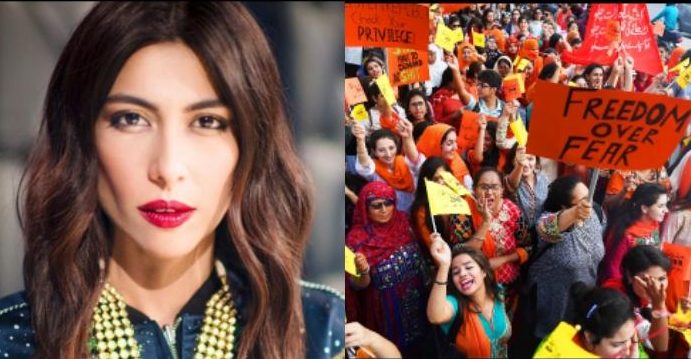A high profile case emerged between two famous vocal artists, one of which, Meesha Shafi, accuses the other, Ali Zafar, of harassment and disorderly behaviour. This all, midst a global movement for equality.
Women’s rights have always been known to be Human Rights, after all, everyone is made equal to each other. But, in countries like Pakistan, the message is more implicit than the meaning.
A report by OHCHR outlined the importance of the basic right women have, to live equally or above men, “The universality of human rights and their validity in a given local context have often been contested through relativist discourses that brand them as foreign ideas incompatible with local culture”.
This basically echoes the idea of questioning western acceptance. It goes on to say, “The definition of discrimination in the Convention on the Elimination of All Forms of Discrimination against Women encompasses a variety of possible discriminatory actions (any distinction, exclusion or restriction) having either the express purpose or the actual effect of discriminating against women.”
Read more: China’s marriage rate is plummeting – and it’s because of gender inequality
Injustice of Pakistan’s justice system
Now, in a tricky place like Pakistan, it is difficult for justice to be served, and that too impartially. In the odd case, that this does happen, politics is the main driver, in which case these two are not.
After alleging accusations, Shafi, who is known for her diverse cultural music, found herself in the middle of South Asia’s #MeToo Movement, and due to the loophole in Pakistan’s law, specifically in the state of Punjab, women are often left wondering why the blame always comes back to them, as it did in this case too, with defamation lawsuits and local government action (to some extent).
Read more: Meesha Shafi #MeToo?
The complaint against Zafar, 40, charted a case which noted his inappropriate behaviour in their workplace and encouraged the court to see action against this “hostile or offensive work environment” under section 2(h), but as we have learned in all cases before this, the buck does not stop with men.
Pakistan’s system protects against harassment outside the workplace but doesn’t accept legal action other than legal complaints which can be submitted to local police. That’s sometimes not the best, as it sometimes takes years to process such legal issues, in which case, the accused dies.
Now, Shafi is threatened with jail time for so-called defamation. Meesha Shafi’s case has huge impacts as this could turn out disastrous for her career, but also for women who already see themselves as cautious to come forward.
Read more: Meesha Shafi booked for slandering Ali Zafar
The case dividing the country
Meesha Shafi’s case has impacted the country. Divisions have spread, even in corporate country, as the social industry has taken sides and vividly shown their views on the matter. Refrigerator ads feature Ali Zafar, while Smartphone advertisements star women’s rights advocates, those too strongly against the accused actor/singer.
Until a few years ago in this predominantly Muslim, and Sunni community, Women’s rights were deemed as this “western terror”, which would spread hate and division among the “faithful”.
It was a commencement of new liberalization from the non-Muslims and if you know conservatives, you know they shoot down any and all ideas from the other side of the world, no matter where you live.
Read more: ‘Aurat March’ in Pakistan: Feminists vs Mullahs!
They would often dismiss it by charting that the religion teaches equality, not realizing they do not follow it. In fact, this disinformation tactic is used to this day and is further fueled by the arrival of the month of March.
Taking to social media, you see the country divided. Some politicians bringing religion to the topic to suppress these voices. This case was to be a wakeup call, instead, it was a backflip off a cliff, hoping there would be clouds below for safe haven. And apparently, this never-ending fall resulted in extremity and a rapid shift towards right and wrong.
A never-ending battle?
Three years ago, on the 8th of March, the first “Aurat March” or “Women’s March” was held in Karachi. Since then, it has spread as a movement revolutionizing and women in both urban communities and rural slums. Awakened from centuries-old thinking, they take to the streets and celebrate the idea of being a woman in their own way.
The “Aurat Movement” was organized by a vast group of influential women. From educationalists to diplomats, and even social workers, the progress continued forward to more than just a few sessions and verbal communication. Patience is not the answer, ever. Always remember that. If people tell you to sit down, you stand up and fight back.
Read more: Pakistani culture vs Women empowerment: Should Aurat March be held?
Now, some arguably do take it out of touch, especially when catchy banners and coloured posters are displayed across highways and freeways. But others see it as an opportunity to avoid the female cancel culture which exists in the society and the harsh atmosphere these circumstances have made.
The reality of the situation is that around the world, in every city of every country, people are known to respect women’s rights, whether they agree with them or not. And this fact has been established for a few years now, however, in Pakistan, it’ll take time and if it doesn’t really reach the minimum required point, we could be seeing the same traditions for years to come considering its 2021 and not the ice age.
Juan Abbas is a freelance writer for the Daily Times. The views expressed in this article are the author’s own and do not necessarily reflect the editorial policy of Global Village Space.













